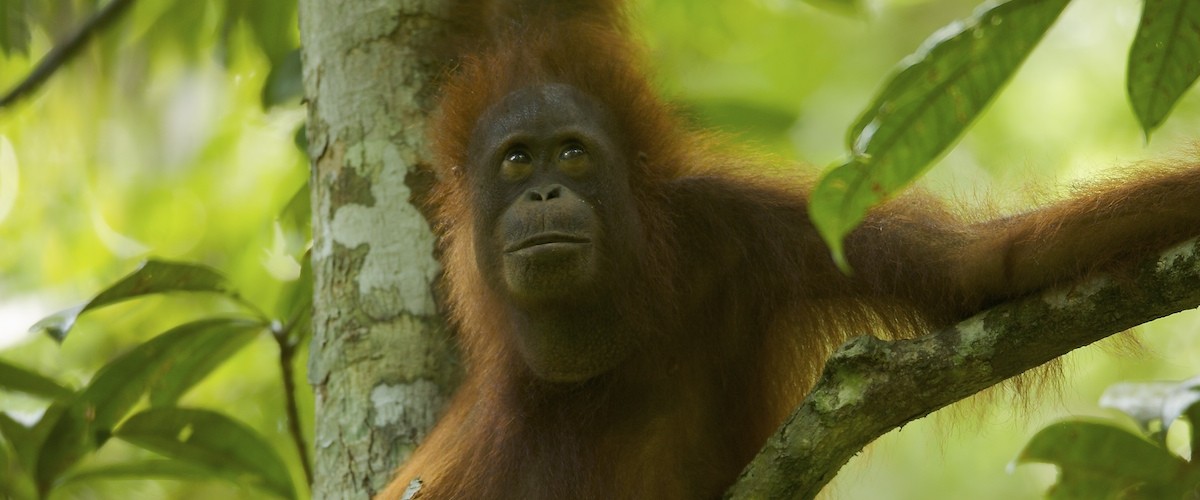By Natalie Robinson, Program Coordinator
It’s difficult to believe another year has already come to an end while we are still living in the strange new realities of COVID-19. Though foreign staff members have been back in their home countries since March 2020, we’ve been fortunate to keep busy at GPOCP, and have made great strides towards the conservation of wild orangutans.
At the beginning of 2021, we held our annual meeting. Staff from both our conservation and research teams joined together to share the accomplishments of the previous year and discuss goals for the coming year.

In February, we carried out the first Environmental Education Expeditions of the year, traveling to remote villages in Ketapang Regency, and welcomed the newest members of our volunteer youth group, REBONK, during the 10th annual inauguration ceremony.
Later that month, we published an exciting new article in Biological Conservation which highlights our 25 years of research and conservation on orangutans in Gunung Palung National Park, as well as another article about confronting ethical challenges in long-term research programs. We then signed a new formal agreement with the National Park Bureau to continue to strengthen our working relationship over the next 5 years.
We celebrated the defense of two PhD dissertations in March, from Dr. Andrea Blackburn and Dr. Amy Scott, both of whom conducted their dissertation field research at Cabang Panti Research Station. They later graduated from Boston University, officially receiving their PhDs in May.
In April we were honored to have our project featured in The Atlantic magazine, in an article written by Wudan Yan. The piece highlights stories from Executive Director Dr. Cheryl Knott, Field Research Assistants Sahril Ramadani and Sabta Pelari, and Research Director Wahyu Susanto. This feature focuses on the invaluable role which local collaborators play in field research, which is why our project has been able to continue since the onset of the pandemic.
We then celebrated Earth Day, which followed the theme “Restore our Earth.” Our many youth group members and West Bornean Orangutan Caring Scholarship students organized and ran a variety of in-person and online activities.

We also selected six new students for West Bornean Orangutan Caring Scholarships (WBOCS), and this 10th class of recipients was officially awarded and recognized in May. These well-deserving students have now completed their first semester of university classes, as they continue on their journey of becoming the next generation of conservationists.
Later in May, we completed a series of tree planting projects to rehabilitate land that was previously burned, surrounding three of the Customary Forests. A total of 6,000 tree seedlings were planted, including rubber trees, betel nut, petai bean and jengkol bean.
In June, we collaborated with the International Institute for Environment and Development (IIED) to conduct a Site-level Assessment of Governance and Equity (SAGE) in the Banjar Lestari Customary Forest. We were proud to help pilot this tool, which aims to enable stakeholders to assess the status of governance and equity, plan actions to improve, and monitor progress. We rounded out the month by celebrating World Rainforest Day, making videos and participating in Rainforest Live.
In July, we released a new edition of our Indonesian language newsletter, MIaS, focusing on the theme “Wise management of natural resources in an effort to reduce the impact of climate change.”

We celebrated World Orangutan Day in August. In September, we commenced a series of biodiversity surveys throughout each of our Customary Forests and witnessed a fascinating interaction between an adult female orangutan and a Bornean slow loris.
Throughout October, members of the Customary Forest Management Boards (LPHD) continued to carry out Spatial Monitoring and Reporting Tool (SMART) patrols, in order to monitor forest activity, searching for signs of fire or logging, taking note of wildlife and changes in vegetation.
In November, we celebrated Orangutan Caring Week with a series of events run by our youth volunteers and WBOCS recipients. GPOCP-supported master’s student and long-time collaborator, Endro Setiawan, defended his thesis and graduated cum laude, receiving accolades for having the highest GPA among graduate students at the National University (UNAS) this year. In the US, graduate and undergraduate students presented on their orangutan research at the Northeastern Evolutionary Primatologists (NEEP) annual meeting, which we helped host at Boston University.

In December we finalized the building design and began purchasing materials to build our satellite camp in the Rankgong degraded forest area, where we’ve begun additional research, between Cabang Panti and the edge of the National Park. Construction is set to begin in January 2022.
In total, our research team have spent over 3,200 hours following wild orangutans, collecting behavioral data. Researchers have collected over 220 fecal samples and 90 urine samples. More than 750 new feeding trees were tagged, and we continued the monitoring of two different long-term phenological datasets throughout the research area.
The staff at Cabang Panti Research Station and the Yayasan Palung conservation office have continued to persevere, step into new roles, and take on new challenges, despite the still ongoing pandemic. We are grateful for everyone’s hard work and optimistic that the next year will bring even more successes!






